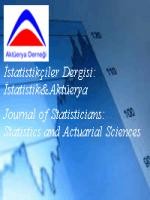Bulanık Lojistik Regresyon için Entegre Bir Yaklaşım
Bu çalışmanın amacı, kesin girdiler ile bulanık ikili çıktı arasındaki ilişkiyi tanımlamak için birleştirilmiş bulanık lojistik regresyon yaklaşımını tanıtmaktır. Bu nedenle, her bir durum için bir olasılık ölçüsü tanımlamak ve daha sonra olabilirlik oranlarının logaritmik dönüşümünü bulanık çıktı gözlemleri olarak kullanmak amacıyla Pourahmad ve ark. [17] ve Sohn ve ark. [24]tarafından önerilen bulanık lojistik regresyon yöntemleri entegre edilmiştir. Bulanık lojistik regresyon modelinin parametrelerini tahmin etmek için, Diamond [5]’ın Bulanık En Küçük Kareler (FLS) yaklaşımı kullanılmıştır. Sayısal bir örnek sunulmuş ve elde edilen sonuçlar klasik lojistik regresyon modeli ile karşılaştırılmıştır.
Anahtar Kelimeler:
Bulanık Lojistik Regresyon, Olabilirlik Oranları, Bulanık En Küçük Kareler
An Integrated approach for fuzzy logistic regression
The aim of this study is to introduced an integrated fuzzy logistic regression approach to describe the relationship between crisp inputs and fuzzy binary output. For this reason, we integrated the fuzzy logistic regression methods proposed by Pourahmad et al. [17] and Sohn et al. [24] to define a possibility measure for each case and then used the logarithmic transformation of possibilistic odds as fuzzy output observations. To estimate the parameters of the fuzzy logistic regression model, Diamond [5]’s Fuzzy Least Squares (FLS) approach is used. A numerical example is presented and obtained results are compared with classic logistic regression model.
___
- [1] B.L. Aswathi, 2009, Sensitivity, Specificity, Accuracy and the relationship between them, in: Bioinformatics.
- [2] A. Celmiņš, 1987, Least squares model fitting to fuzzy vector data, Fuzzy Sets and Systems, 22, 245-269.
- [3] P.T. Chang, E.S. Lee, 1994, Fuzzy linear regression with spreads unrestricted in sign, Computers & Mathematics with Applications, 28, 61-70.
- [4] P. D'Urso, 2003, Linear regression analysis for fuzzy/crisp input and fuzzy/crisp output data, Computational Statistics & Data Analysis, 42, 47-72.
- [5] P. Diamond, 1988, Fuzzy least squares, Information Sciences, 46, 141-157.
- [6] M. Hojati, C.R. Bector, K. Smimou, A simple method for computation of fuzzy linear regression, European Journal of Operational Research, 166 (2005) 172-184.
- [7] C. Kao, C.-L. Chyu, 2002, A fuzzy linear regression model with better explanatory power, Fuzzy Sets and Systems, 126, 401-409.
- [8] U.T. Khan, C. Valeo, 2015, A new fuzzy linear regression approach for dissolved oxygen prediction, Hydrological Sciences Journal, 60, 1096-1119.
- [9] M. Ming, M. Friedman, A. Kandel, 1997, General fuzzy least squares, Fuzzy Sets and Systems, 88, 107-118.
- [10] M. Modarres, E. Nasrabadi, M.M. Nasrabadi, 2005, Fuzzy linear regression models with least square errors, Applied Mathematics and Computation, 163, 977-989.
- [11] M. Namdari, A. Abadi, S.M. Taheri, M. Rezaei, N. Kalantari, N. Omidvar, 2014, Effect of folic acid on appetite in children: Ordinal logistic and fuzzy logistic regressions, Nutrition, 30, 274-278.
- [12] M. Namdari, J.H. Yoon, A. Abadi, S.M. Taheri, S.H. Choi, 2015, Fuzzy logistic regression with least absolute deviations estimators, Soft Computing, 19, 909-917.
- [13] M.M. Nasrabadi, E. Nasrabadi, A.R. Nasrabady, 2005, Fuzzy linear regression analysis: a multi-objective programming approach, Applied Mathematics and Computation, 163, 245-251.
- [14] E.C. Özelkan, L. Duckstein, 2000, Multi-objective fuzzy regression: a general framework, Computers & Operations Research, 27, 635-652.
- [15] G. Peters, 1994, Fuzzy linear regression with fuzzy intervals, Fuzzy Sets and Systems, 63, 45-55.
- [16] S. Pourahmad, S. Ayatollahi, S.M. Taheri, 2011a, Fuzzy Logistic Regression: A New Possibilistic Model And Its Application In Clinical Vague Status, Iranian Journal of Fuzzy Systems, 8, 1-17.
- [17] S. Pourahmad, S.M.T. Ayatollahi, S.M. Taheri, Z.H. Agahi, 2011b, Fuzzy logistic regression based on the least squares approach with application in clinical studies, Computers & Mathematics with Applications, 62, 3353-3365.
- [18] UCI Machine Learning Repository,Pima India Data Sets. http://archive.ics.uci.edu/ml/datasets/Pima+%20Indians+Diabetes.
- [19] T.J. Ross, 2010, Fuzzy Logic with Engineering Applications, John Wiley & Sons, Ltd.
- [20] M. Sakawa, H. Yano, Multiobjective fuzzy linear regression analysis for fuzzy input-output data, Fuzzy Sets and Systems, 47 (1992) 173-181.
- [21] M. Sakawa, H. Yano 1992a, Fuzzy linear regression analysis for fuzzy input-output data, Information Sciences, 63, 191-206.
- [22] D.A. Savic, W. Pedrycz, 1991, Evaluation of fuzzy linear regression models, Fuzzy Sets and Systems, 39, 51-63.
- [23] H. Shakouri G, R. Nadimi, 2009, A novel fuzzy linear regression model based on a non-equality possibility index and optimum uncertainty, Applied Soft Computing, 9, 590-598.
- [24] S.Y. Sohn, D.H. Kim, J.H. Yoon, 2016, Technology credit scoring model with fuzzy logistic regression, Applied Soft Computing, 43, 150-158.
- [25] H. Tanaka, 1987, Fuzzy data analysis by possibilistic linear models, Fuzzy Sets and Systems, 24, 363-375.
- [26] H. Tanaka, S. Uejima, K. Asai, 1982, Linear Regression Analysis with Fuzzy Model, IEEE Transactions on Systems, Man, and Cybernetics, 12, 903-907.
- [27] H. Tanaka, J. Watada, 1988, Possibilistic linear systems and their application to the linear regression model, Fuzzy Sets and Systems, 27, 275-289.
- [28] M.-S. Yang, T.-S. Lin, 2002, Fuzzy least-squares linear regression analysis for fuzzy input–output data, Fuzzy Sets and Systems, 126, 389-399.
- [29] J.H. Yoon, S.H. Choi, 2013, Fuzzy Least Squares Estimation with New Fuzzy Operations, in: R. Kruse, R.M. Berthold, C. Moewes, Á.M. Gil, P. Grzegorzewski, O. Hryniewicz (Eds.) Synergies of Soft Computing and Statistics for Intelligent Data Analysis, Springer Berlin Heidelberg, Berlin, Heidelberg, s. 193-202.
- ISSN: 1308-0539
- Yayın Aralığı: Yılda 2 Sayı
- Başlangıç: 2008
- Yayıncı: Aktüerya Derneği
Sayıdaki Diğer Makaleler
Matris değişkenli Laplace dağılımı: Özellikleri ve parametre tahmini
Uzunlamasına kısmi-sürekli veri için marjinalleştirilmiş çok seviyeli rastgele etkili bir model
Bulanık Lojistik Regresyon için Entegre Bir Yaklaşım
Nimet Yapıcı PEHLİVAN, Aynur ŞAHİN
Kasko sigortasında hasar nedenlerinin yarışan riskler regresyon modeli ile analizi
